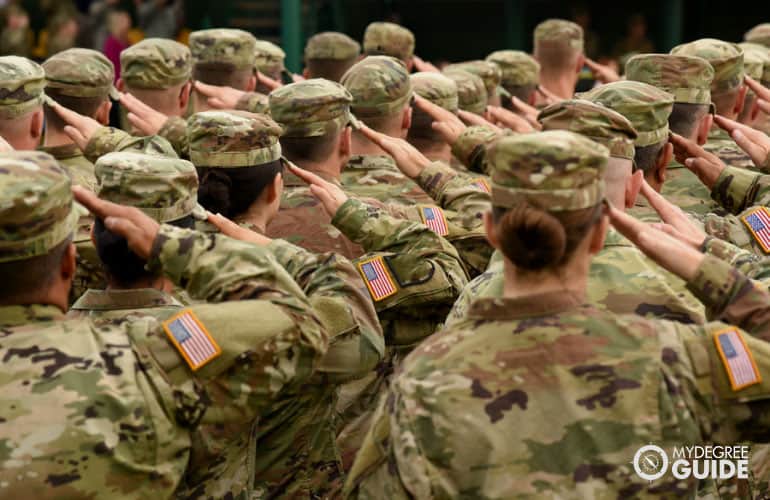You could possibly graduate faster and save money by getting credit for what you already know with a College Credit for Prior Learning Assessment (PLA).

Editorial Listing ShortCode:
Universities Offering Credit for Prior Learning Assessment Opportunities
The universities below offer credit for prior learning opportunities, but it’s important to verify credit-granting policies directly with the university.
| University | Accreditation |
| Adelphi University | Middle States Commission on Higher Education |
| Albertus Magnus College | New England Commission of Higher Education |
| Alverno College | Higher Learning Commission |
| Andrews University | Higher Learning Commission |
| Anoka Ramsey Community College | Higher Learning Commission |
| Berklee College of Music | New England Commission of Higher Education |
| Blackhawk Technical College | Higher Learning Commission |
| Boise State University | Northwest Commission on Colleges and Universities |
| Broward College | Southern Association of Colleges and Schools |
| Bryan College | Southern Association of Colleges and Schools |
| California State University | WASC Senior College and University Commission |
| Central Maine Community College | New England Commission of Higher Education |
| Central Michigan University | Higher Learning Commission |
| Central New Mexico Community College | Higher Learning Commission |
| Century College | Higher Learning Commission |
| Charter Oak State College | New England Commission of Higher Education |
| Chemeketa Community College | Northwest Commission on Colleges and Universities |
| City University New York | Middle States Commission on Higher Education |
| Clark College | Northwest Commission on Colleges and Universities |
| Clinton Community College | Middle States Commission on Higher Education |
| Coffeyville Community College | Higher Learning Commission |
| Colby Community College | Higher Learning Commission |
| Colorado Christian University | Higher Learning Commission |
| Colorado State University | Higher Learning Commission |
| Columbia College | Higher Learning Commission |
| Davenport University | Higher Learning Commission |
| DeSales University | Middle States Commission on Higher Education |
| DeVry University | Higher Learning Commission |
| Eastern Kentucky University | Southern Association of Colleges and Schools |
| Edgewood College | Higher Learning Commission |
| Fox Valley Technical College | Higher Learning Commission |
| Friends University | Higher Learning Commission |
| Granite State College | New England Commission of Higher Education |
| Harper College | Higher Learning Commission |
| Highland Community College | Higher Learning Commission |
| Iowa Western Community College | Higher Learning Commission |
| Jefferson College | Higher Learning Commission |
| Kansas State University | Higher Learning Commission |
| Lakeland University | Higher Learning Commission |
| Lakeshore Technical College | Higher Learning Commission |
| Lamar University | Southern Association of Colleges and Schools |
| Lesley University | New England Commission of Higher Education |
| Linfield College | Northwest Commission on Colleges and Universities |
| Lower Columbia College | Northwest Commission on Colleges and Universities |
| Macomb Community College | Higher Learning Commission |
| Metropolitan College | New England Commission of Higher Education |
| Midway University | Southern Association of Colleges and Schools |
| Minnesota State Colleges and Universities | Higher Learning Commission |
| Montgomery College | Middle States Commission on Higher Education |
| Moraine Park Technical College | Higher Learning Commission |
| University of Massachusetts – Amherst, Mount Ida Campus | New England Commission of Higher Education |
| Niagara County Community College | Middle States Commission on Higher Education |
| Northcentral Technical College | Higher Learning Commission |
| Northern Kentucky University | Southern Association of Colleges and Schools |
| Ohio Christian University | Higher Learning Commission |
| Pace University | Middle States Commission on Higher Education |
| Pellissippi State Community College | Southern Association of Colleges and Schools |
| Portland Community College | Northwest Commission on Colleges and Universities |
| Portland State University | Northwest Commission on Colleges and Universities |
| Post University | New England Commission of Higher Education |
| Pulaski Technical College | Higher Learning Commission |
| Rio Salado College | Higher Learning Commission |
| Rochester Community and Technical College | Higher Learning Commission |
| Rogue Community College | Northwest Commission on Colleges and Universities |
| Seattle Central College | Northwest Commission on Colleges and Universities |
| Simmons University | New England Commission of Higher Education |
| South Dakota State University | Higher Learning Commission |
| Southeast Arkansas College | Higher Learning Commission |
| Southern New Hampshire University | New England Commission of Higher Education |
| Southwest Wisconsin Technical College | Higher Learning Commission |
| Spokane Falls Community College | Northwest Commission on Colleges and Universities |
| Strayer University | Middle States Commission on Higher Education |
| Temple University | Middle States Commission on Higher Education |
| Thomas Edison State University | Middle States Commission on Higher Education |
| Tulane University | Southern Association of Colleges and Schools |
| University of Akron | Higher Learning Commission |
| University of Arizona | Higher Learning Commission |
| University of Colorado | Higher Learning Commission |
| University of Maryland | Middle States Commission on Higher Education |
| University of Massachusetts | New England Commission of Higher Education |
| University of Memphis | Southern Association of Colleges and Schools |
| University of Phoenix | Higher Learning Commission |
| University of Wisconsin | Higher Learning Commission |
| Virginia Western Community College | Southern Association of Colleges and Schools |
| Walden College | Higher Learning Commission |
| Washburn University | Higher Learning Commission |
| Waukesha County Technical College | Higher Learning Commission |
| Westfield State University | New England Commission of Higher Education |
| Wichita State University | Higher Learning Commission |
| Wilmington University | Middle States Commission on Higher Education |
| Wisconsin Lutheran College | Higher Learning Commission |
Colleges Offering College Credit for Prior Learning Assessments
Some colleges allow you to receive college credit for job training, professional experience, or military training.
Credit for Prior Learning includes any college credit given for activities outside the classroom. It’s up to each university to determine if your work experience, military training, and other related experience will be approved for college credit.
When I submitted my portfolio, I was awarded 18 credit hours for my computer-related work experience. That’s the equivalent of over half a year of college (6 classes).
You may qualify for even more. You won’t know until you try!
Each university has its own credit for prior learning policies, so be sure to reach out to an advisor to get info specifically tailored to you.
- Prior Learning Assessment – Get up to 30 college credits through this method. Each university has its own policy for assessing and granting prior learning credits. Most universities ask you to submit a portfolio detailing relevant work experience, certifications, military training, or formal training. Check with your target university to see how they assess credit for prior learning.
- Credit by Exam – Get up to 30 college credits through this method. CLEP exams and DSST exams are the most common. Some universities also offer their own institutional challenge exams for specific courses.
Be sure to verify the policies of your target university to see exactly what they require to approve and award credit for your career experience, certifications, and other prior learning.
What Is a College Credit for Prior Learning Assessment?

When researching credit for prior learning, the information can seem overwhelming… and often confusing! That’s because this broad term covers a wide variety of different options for turning your experience into college credit or advanced degree placement.
Your school may also refer to it under a different name, such as experiential learning or alternative credit. Whatever it is called, credit for prior learning boils down to one thing:
taking your prior education, career, or military experience and translating that into credit toward specific classes in your degree that lessen the expense and duration of your program.
The first step toward figuring out how you can make these educational programs work for you is by getting in touch with your college admissions team.
The transfer and advising departments of your university are a good place to start, and they can guide you in the right direction. To give you a better idea of what to expect when talking with your advisors, I will cover some of the most common options available to earn credit for prior learning.
Testing Out of College Classes

If your college offers credit for prior learning, chances are that testing out of your courses is one of the options that you can consider.
There are several different nationwide exams that you can take to demonstrate your mastery of a subject. After you’ve successfully completed your exam, may be able to present it to your school and request credit for the equivalent course.
Most schools have a limit on the number of credits that you can receive through examination, so be sure that you thoroughly understand the policies before spending time and money on taking these exams!
College Level Examination Program (CLEP) Credit

The College Level Examination Program, commonly called CLEP, is the most widely accepted exam for earning credit from prior learning. Over 2,900 colleges and universities across the country accept CLEP credits, and all of the exams are reviewed and accepted by ACE Credit – the premier standard for earning credit for prior learning.
CLEP offers 33 different examinations covering a wide range of course subjects, and each test will cost you around $89. This fee is not refundable if you fail to pass the test, but it is still worth the expense if it results in saving you hundreds of dollars in taking an on-campus course!
DSST Credit

Another exam that is popular for earning credit by examination is known as DSST. Although similar to the CLEP, there are certain facts that can be helpful to know before taking this test, including:
- Exams are accepted at over 1,900 higher education institutions
- There are 30+ DSST exams, all of which are recommended by ACE Credit
- Exam fee starts at $85, although additional testing center fees may apply
- Each test covers 100 questions, and you are given two hours to complete the exam
A unique feature of DSST is its support of veterans and military members trying to advance their education. If you have been in the armed services, your first-attempt test should be fully covered by the DSST program!
Excelsior College Exams (ECE)

The Excelsior College Exams are another option for earning credit by examination, although they are not as widely accepted as the DSST or CLEP. It is always a good idea to check with your specific school before registering for this test to see if it is a participating university.
The ECE offers a broader range of subjects than other nationwide exam programs, and you can test on over 50 different college-level topics. The cost of this test is also a bit higher at $110, but there are options available for payment plans and purchasing combination packages to save money when registering for your tests.
University Challenge Exams
Challenge exams (also known as Institutional Exams) are a unique way for you to progress through your degree program at a quicker pace. These are not nationwide programs; instead, they are tests offered by specific colleges that are open to their student body as a way to earn credit for prior knowledge.
The structure of these tests is often similar to the final exams of the corresponding college course, and they are designed to allow you to show your mastery of the subject matter that would be learned throughout the duration of the class.
Not every school offers Challenge Exams, but if your school does offer them, they can be a low-cost, convenient option for knocking some time and money off of your degree program.
Advanced Placement and Dual Credit Options
Are you a high school student who wants to get a head start on your degree? Or maybe you’ve looked through your degree course descriptions and feel like you already know the material? Then there are several possible options available for getting dual credit or advanced placement in order to get through college faster!
The most common options offered by colleges and universities include:
- Advanced Placement (AP) Programs: AP credit can be earned by taking an examination and achieving a score of three or higher. If you pass the exam, your school may offer credit towards your degree program or give you advanced standing so you can skip over some of the general courses – shortening your degree timeframe!
- Dual Credit Options: This option is open to high school students that want to earn college credit while completing their high school graduation requirements. By taking college-level courses at your high school, you will earn credit that will appear on a transcript that you can submit to your future college.
- International Baccalaureate (IB): Another option for high schoolers to earn credit before graduation is through the IB Diploma Program. During your junior and senior years, you can complete a rigorous course of study that translates into credit accepted at many recognized colleges around the world.
Like other credit for prior learning options, each college and university has its own set of regulations for the number and type of credit they will accept.
Choosing to get started on your degree program while still in high school is an excellent way for driven students to fast-track their future education, but it is important to do your research before deciding on the route that is best for you.
How to Get College Credit for What You Already Know

Education is not a one-size-fits-all journey, and if you’re anything like me, you know that valuable skills and knowledge can be gained through life and job experience in addition to sitting through college classes!
There are many ways that we learn skills throughout life – from traveling and acquiring new languages to military service or on-the-job training experience. If you feel that your journey has taught you the same set of skills found in general degree classes, then exploring your options for getting credit for prior learning is worth looking into!
Credit for Prior Learning Portfolio

If you’d like to earn college credit without taking exams, you can try and showcase your knowledge of specific subject areas to your school through what is called credit for prior learning portfolio. Think of this portfolio as an abbreviated snapshot of all of the training, certifications, and specialty skills you’ve picked up along the way.
Each school has its own process for submitting a portfolio, but here are some basic steps to get you started:
- Evaluate the course descriptions of your classes to determine which courses you would like to receive credit for with a portfolio.
- Meet with your academic advisor to get a full understanding of your school’s policies.
- Gather all required documentation to meet your college’s portfolio requirements.
- Submit your portfolio for review, and pay the required fees outlined by your school.
As with other credit for prior learning options, there is no set standard for what your college is required to accept as credit toward your degree program. Some schools may only allow a few credits to be earned through a portfolio, while others may allow you to submit portfolios for multiple courses.
Military Training and Service

Like many Americans, I’ve always had great respect for members of our armed forces, and the skills that you learned throughout your military service are applicable well beyond your job duties.
There are several ways that you may be able to turn your military experience into college credit, and a joint services transcript is probably the most common option. This official record of your training is approved by ACE Credit and can be submitted to your school for consideration in earning credit towards a degree.
In addition to a joint services transcript, you also have the option of testing out of classes through examinations such as the DSST and CLEP. You can even get the fee for your first attempt on a DSST exam covered by showing proof of your military service!
Another route you can take is to submit a prior learning portfolio to your school that showcases your skills, certification, and training that relates to specific college classes.
Questions Related to College Credit for Prior Learning
Here are our answers to a few more common questions potential students ask about earning credit for life and work experience.
What Is a Life Experience Degree?

Some accredited colleges offer prior learning assessments (this article talks about this if you’re not familiar with the practice) that will look at your life and work experience to see if it meets certain criteria. They won’t give you credit for the entire degree, but some college credits may be awarded.
To earn credit, you’ll need to demonstrate that you’re previous training or work experience has met the learning objectives for specific courses.
What Is College Credit for Life Experience?
This is another term for PLA (Prior Learning Assessment) or Credit for Prior Learning. You and your admissions counselor will match your previous training and/or work experience to the learning objectives of specific courses you need for your degree.
If you’ve already learned what a course teaches, you may be able to get credit for that course without having to take the class. Be aware though, that even if you’re an expert in your field, accredited universities will limit the number of credits you can claim outside of coursework.
Is a Life Experience Degree Regionally Accredited?
Regionally accredited universities do not offer entire degrees based on your life or work experience. To maintain their high standards, they need to assess your knowledge in the classroom and any practicums that your degree requires. Regionally accredited schools may, however, give you some credit for your prior life/work experience.
You can work with your admissions counselor on a Prior Learning Assessment or creating a Credit for Prior Learning portfolio, in which you determine which course materials you’ve already mastered. It’s common for universities to allow 15-30 credits for prior experiences.
Are Life Experience Degrees Legitimate?

Earning college credit for your work and life experience is a valid, acceptable way to earn college credits at some regionally accredited universities. They won’t allow you to earn your entire degree or even the majority of it based on prior learning, but they may award up to 15 or even 30 credits based on what you already know.
Your admissions counselor will match course objective to your knowledge to determine if you need to take the class or not. You could possibly save yourself one or two semesters worth of work by submitting a Credit for Prior Learning portfolio.
PLA: Make it Happen!

Enrolling in college and earning a degree is a major accomplishment – but that doesn’t mean that you want to spend thousands more on tuition than you have to!
By exploring the various options available for earning credit for prior learning, you can take steps toward completing your degree in a faster timeframe and cutting down on the overall expense of your program.
Related Guides:

